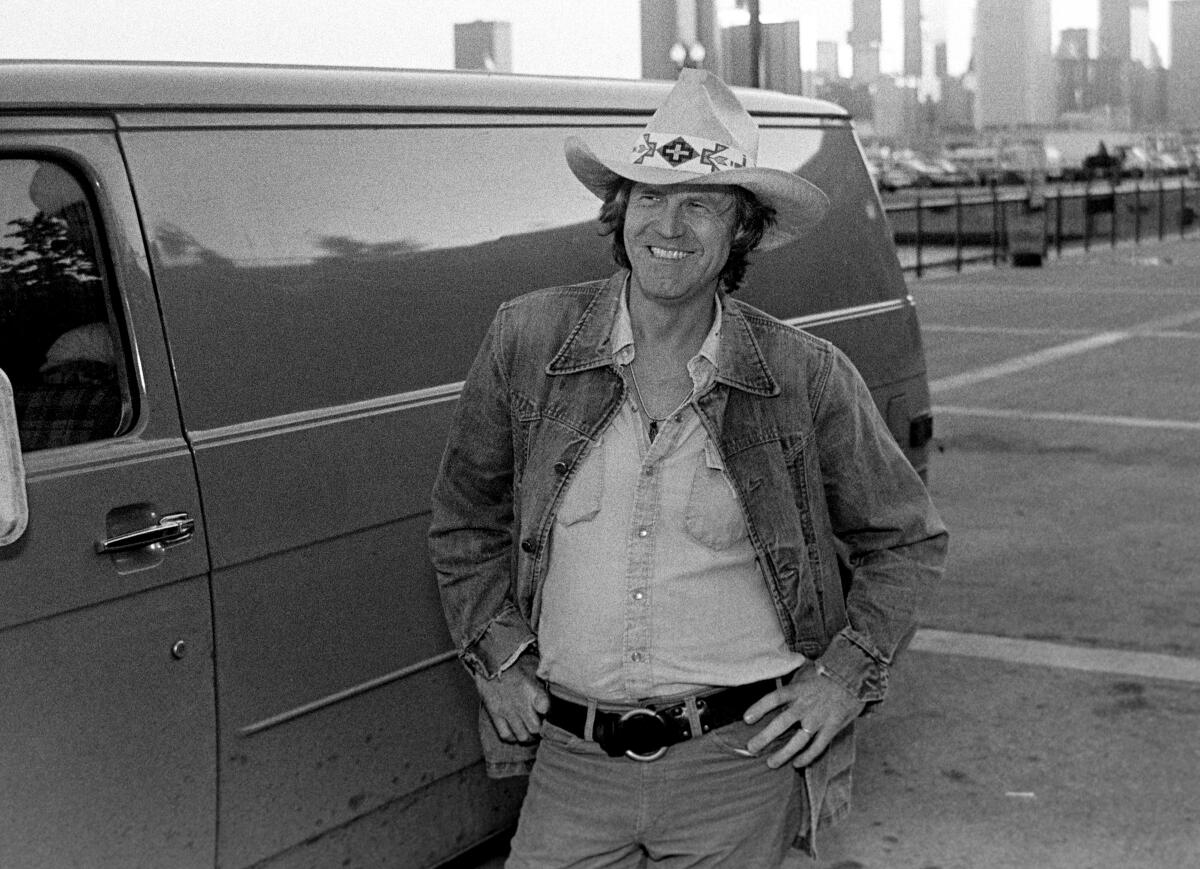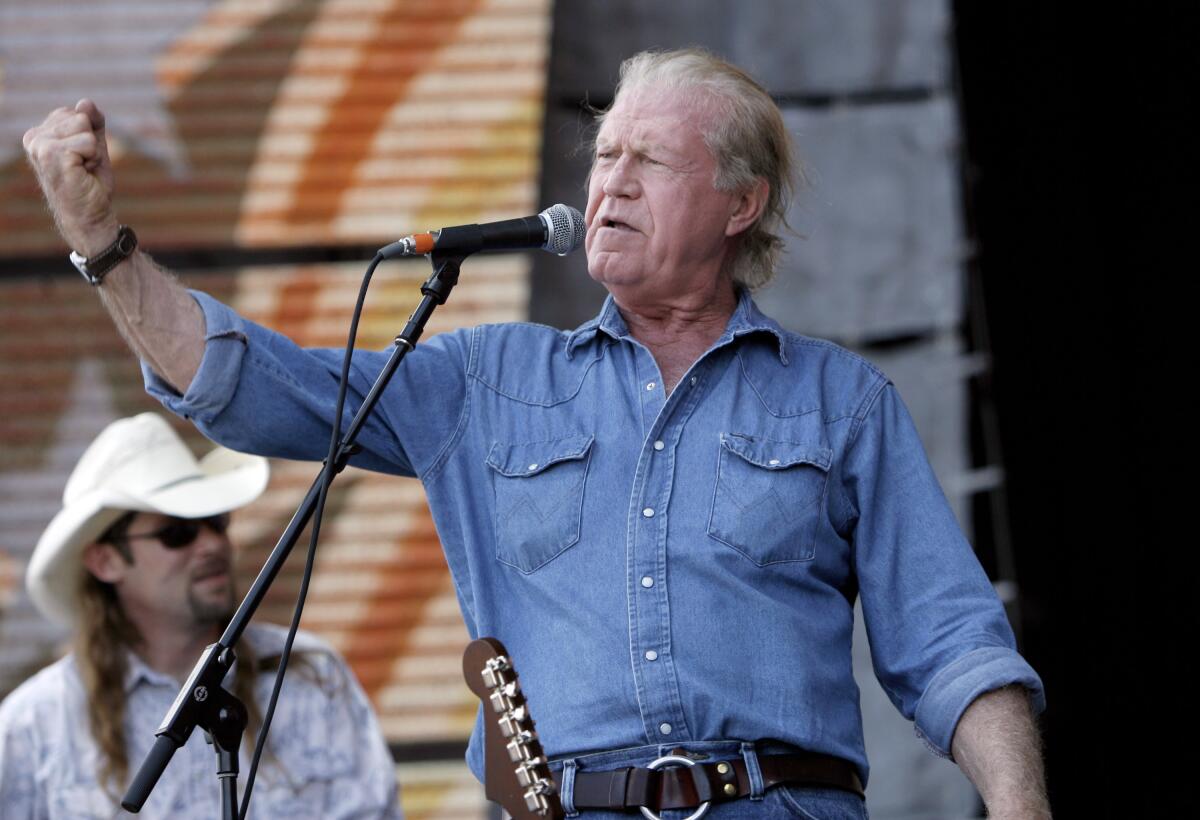Billy Joe Shaver, pivotal outlaw country singer-songwriter, dies at 81

- Share via
Billy Joe Shaver, a pivotal figure in the outlaw country movement of the 1970s, died Wednesday after suffering a stroke at his home in Waco, Texas. Shaver’s friend Connie Nelson confirmed his death to Rolling Stone. He was 81.
Although he regularly played gigs through his final years, Shaver’s greatest success came as a songwriter. He penned a few hits as a Nashville staff writer in the 1960s but bristled against the confines of the Music City, so he headed back to his native Texas where he wound up at the epicenter of the burgeoning progressive country movement.
His reputation was made when Waylon Jennings devoted the bulk of his 1973 album “Honky Tonk Heroes” to Shaver compositions, including “Black Rose” and “Old Five and Dimers (Like Me).” The latter doubled as the title track for Shaver’s Kris Kristofferson-produced 1973 debut for Monument Records, but his career as a performer was plagued by reckless behavior and excessive drinking. He nevertheless cultivated a loyal cult following that included a number of his peers; Willie Nelson once claimed “Billy Joe is definitely the best writer in Texas” and Bob Dylan dropped his name in a 2009 song called “I Feel A Change Comin’ On.”

Singer-songwriter Jason Isbell wrote on Twitter that “Billy Joe Shaver might’ve been the only true outlaw who ever made his living writing about the inner workings of his heart. The realest of them all.”
Shaver was born on Aug. 16, 1939, in Corsicana, Texas. His father wasn’t part of the picture and his mother often left Billy Joe with his grandmother so she could work at a honky-tonk in Waco. He joined the Navy at 17; his enlistment ended when he threw a punch at an officer. He returned to Texas, establishing roots in Waco, and married his girlfriend Brenda Tindell after she became pregnant with what would turn out to be his only child, Eddy; the couple would marry and divorce three times throughout their lives.
Shaver left his wife and child so he could pursue a musical career in Nashville, but he didn’t get a foot in the door until 1968, when he was hired as a songwriter by Bobby Bare. Kristofferson became Shaver’s first advocate, recording “Good Christian Soldier” on his 1971 album “The Silver Tongued Devil and I,” then inviting the singer-songwriter to perform at the Dripping Springs Reunion in Austin — the first in what would be Willie Nelson’s annual Fourth of July Picnic celebrations — in 1972. Backstage, Shaver caught the attention of Jennings, who pledged to record a full album of the songwriter’s tunes. Shaver held Jennings to his word and the result was “Honky Tonk Heroes,” the album that launched outlaw country.
Capitalizing on this momentum, Shaver cut “Old Five and Dimers” in 1973, but the label closed shortly after its release. He recorded a pair of albums for the Capricorn label in the mid-1970s, but his Texan orneriness, combined with substance abuse, quickly earned him the reputation for being, in his words, “unmanageable.”

Shaver became a born-again Christian at the dawn of the 1980s, a transformation he chronicled on “I’m Just an Old Chunk of Coal (But I’m Gonna Be a Diamond Someday).” He may have found Jesus but trouble still followed Shaver through the years and his travails became as big a part of his legend as his tall tales and songs.
A series of records for Columbia Records in the 1980s expanded his songbook, yet hit records eluded him. Despite the lack of commercial success, Shaver entered a creative renaissance in the late 1980s when he began collaborating with his guitarist son Eddy. The pair formed a band named Shaver and became workhorses in the 1990s, touring steadily and releasing the acclaimed albums “Tramp on Your Street” in 1993 and “Victory” in 1998. Robert Duvall elevated Shaver’s profile by casting him in his 1996 film “The Apostle,” a move that helped kickstart a minor second career as an actor for the singer; he’d appear alongside Duvall again in 2003’s “Secondhand Lions” and 2013’s “A Night in Old Mexico.”

A heroin overdose claimed Eddy on Dec. 31, 2000; Willie Nelson encouraged him to play a concert that evening, telling him, “Billy, you gotta get back on the horse.” Indeed, Shaver kept rolling through the 2000s, gigging steadily and recording a series of albums for Compadre. His recorded output would slow after he shot a man during a bar fight in Lorena, Texas, in 2007. Shaver was acquitted in 2010 and he spun the story into the song “Wacko from Waco.”
Shaver released a final studio album called “Long in the Tooth” in 2014. In January he performed for the last time, singing “I’m Just an Old Chunk of Coal” with Tanya Tucker at Nashville’s Ryman Auditorium.
Shaver is survived by his ex-wife Wanda Lynn Canady.
More to Read
The biggest entertainment stories
Get our big stories about Hollywood, film, television, music, arts, culture and more right in your inbox as soon as they publish.
You may occasionally receive promotional content from the Los Angeles Times.










